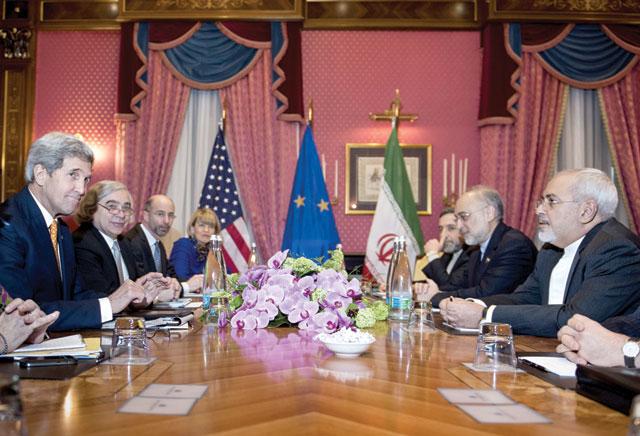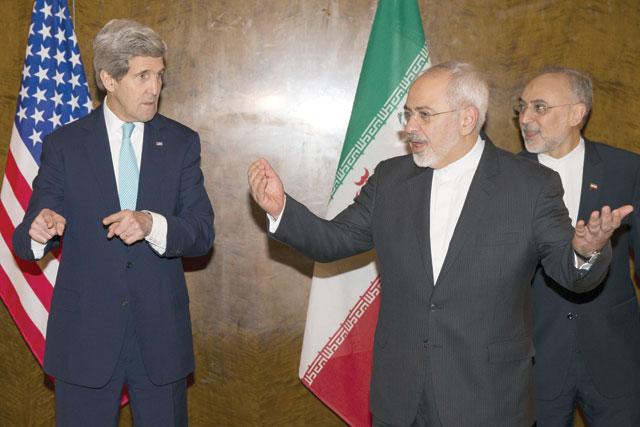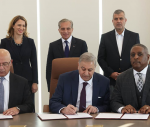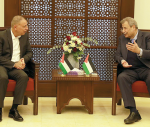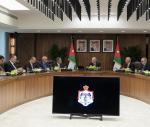You are here
Iran and powers close in on 2-3 page nuclear deal
By Reuters - Mar 28,2015 - Last updated at Mar 28,2015
LAUSANNE, Switzerland — The foreign ministers of France and Germany joined the top US and Iranian diplomats on Saturday to help break an impasse in nuclear negotiations as major powers and Iran closed in on a 2- or 3-page accord that could form the basis of a long-term deal.
The negotiations, in progress for nearly 18 months, aim to hammer out an accord whereby Iran halts sensitive nuclear work in exchange for the lifting of sanctions, with the ultimate aim of reducing the risk of a war in the Middle East.
US Secretary of State John Kerry and Iranian Foreign Minister Mohammad Javad Zarif have been in Lausanne for days to try to reach an outline agreement by a self-imposed deadline of March 31, and they held a further round of talks on Saturday.
While Tehran and the the six major powers — the United States, Britain, France, Germany, Russia and China — could clinch the preliminary framework accord in the coming days, several sticking points remain that could prevent a deal, officials close to the talks said.
"I hope we can get a robust agreement. Iran has the right to civil nuclear power, but with regard to the atomic bomb, it's 'no'," French Foreign Minister Laurent Fabius told reporters on his arrival in Lausanne.
"We have moved forward on certain points, but on others not enough," he said.
Iran denies any ambition to build nuclear weapons and says its atomic programme is for purely civilian purposes.
German Foreign Minister Frank-Walter Steinmeier compared the talks in Lausanne to the final stage of a mountain climb.
"The endgame of the long negotiations has begun," he told Reuters. "And here, with a view of the Swiss mountains, I'm reminded that as one sees the cross on the summit the final metres are the most difficult but also the decisive ones."
Before taking an afternoon bike ride, Kerry lunched with Fabius and Steinmeier to discuss the remaining obstacles to a deal. The two European ministers were also set to meet Zarif as Western and Iranian officials familiar with the negotiations cautioned that they could still fail.
"The sides are very, very close to the final step and it could be signed or agreed and announced verbally," a senior Iranian official familiar with the talks told Reuters.
Ahead of meeting Zarif, Kerry said he expected the discussions to run late. Zarif added that the meetings would run through "evening, night, midnight, morning".
The British, Russian and the Chinese foreign ministers were due to arrive on Sunday.
If agreed, the document would cover key numbers for a comprehensive agreement between Iran and the six powers, such as the maximum number and types of uranium enrichment centrifuges Iran could operate, the size of uranium stockpiles it could maintain, the types of atomic research and development it could undertake and also details on the lifting of international sanctions that have crippled Iran's economy.
Two officials said it was likely that most of the outline agreement would be made public. Others said certain sections would be kept confidential.
Several Iranian officials denied that Iran was close to agreeing an outline document, but a Western diplomat said such comments were aimed at a domestic audience.
"The difficulty is that the Iranians are not moving enough. They like to negotiate right up to the precipice and they're very good at that," a Western diplomat said.
One key number is expected to be the duration of the agreement, which officials said would have to be in place for more than 10 years. Once it expired, there would probably be a period of special UN monitoring of Tehran's nuclear programme.
The framework accord should be followed by a comprehensive deal by June 30 that includes full technical details on the limits set for Iran's sensitive nuclear activities.
Related Articles
The United States and Iran resumed negotiations on Thursday aimed at clinching a nuclear deal before a March 31 deadline, and officials close to the talks said some kind of preliminary agreement between Tehran and six powers was possible.
After marathon negotiations, the United States, Iran and five other world powers announced a deal Thursday outlining limits on Iran's nuclear programme so it cannot lead to atomic weapons, directing negotiators toward a comprehensive agreement within three months.
Simply demanding Iran's capitulation is no way to get a nuclear deal with the Islamic Republic, US Secretary of State John Kerry said on Wednesday as he wrapped up three days of talks with a veiled dig at Israeli Prime Minister Benjamin Netanyahu.


